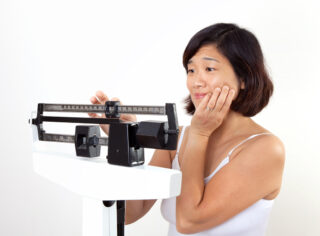
New Day Vitality Hormone Center
1300 Ritchie Highway
Suite B
Arnold, MD 21012
New Day Vitality Hormone Center
8133 Elliott Road
Suite #205
Easton, MD 21601

More Weight Control, Nutrition & Exercise Articles
HRT Fights Middle-Age Weight Gain

Weight gain and changes in body composition are prevalent among postmenopausal women and contribute to increasing health risks as women age. The tendency to add fat around the waist is associated with insulin resistance, metabolic syndrome and tumor growth. All are particularly dangerous.
“Weight gain and body fat distribution changes are responsible, at least in part, for the greater risk of cardiovascular disease in postmenopausal women . . . ,” says Ekta Kapoor, M.B.B.S., a consultant with the Women’s Health Clinic; General Internal Medicine; and Endocrinology, Diabetes, Metabolism, and Nutrition at Mayo Clinic.
But, according to a study in the Journal of Clinical Endocrinology and Metabolism (May 2018), menopause hormone replacement therapy (HRT) is associated with markedly lower visceral fat, BMI and torso fat. Considering CVD is the leading cause of death among women, understanding the role of hormones in these body changes are crucial.
Many of the common symptoms of menopause facilitate weight gain, “including vasomotor symptoms, mood disorders, sleep disturbances and musculoskeletal complaints,” Alice Y. Chang, M.D., a consultant with Endocrinology, Diabetes, Metabolism, and Nutrition at Mayo Clinic.
Vasomotor symptoms — hot flashes and night sweats — are the most common complaint among women going through the menopause transition. Estrogens, the primary female sex hormone, helps maintain body temperature. When estrogen levels drop, the body responds by releasing higher amounts of other hormones that affect the brain’s thermostat. These body temperature fluctuations can wreak havoc on women.
“For example, women with severe vasomotor symptoms, especially at night, might not realize how severe fatigue compromises their ability to remain active. Women are more prone to mood disorders in the perimenopausal period, and that can also interfere with their motivation to make lifestyle changes often required to prevent weight gain,” Chang adds.
Sleep disturbances also interfere with the production of ghrelin, a hormone that acts in areas of the brain to stimulate a feeling of hunger and promote feeding. Sleep deprivation increases ghrelin levels, basically sending out a hunger message to the body. As a result, the person starts to eat though there is no real need to!
Estrogen also influences the metabolism of sugar and fat so, as levels of estrogen drop, women’s bodies burn calories more slowly and bad cholesterol increases. Lower estrogen affects body tissue, contributing to less muscle response to strength training. Estrogen is also tied to tissue repair, so injured muscles heal more slowly. The resulting lower levels of muscle also lowers the rate of metabolism.
There is some good news: A 2019 UCLA study showed that weight increases from shifting hormones often level out after two years from a woman’s final menstrual period. However, those lower postmenopausal hormones mean one must eat less and work out harder just to maintain body weight. Losing weight will take considerable effort, but is possible. And adding HRT could boost control of body fat.
Other Articles You May Find of Interest...
- MAY MARKS CELIAC AWARENESS MONTH
- Lifestyle Changes To Lower Cholesterol
- Let’s Get Physical: Making Physical Activity a Part Of Your Family Life
- Bariatric Surgery and Sleep Apnea
- Top 4 Benefits Of Enrolling In Nutrition Courses Today
- Essential Guide to Safely and Effectively Assessing Health Supplements
- Understanding the Role of Peptides in Healing and Recovery

















